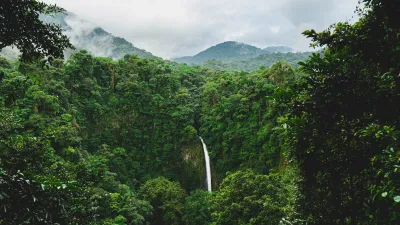
Arenal Volcano in La Fortuna, Costa Rica: A Natural Marvel
Nestled in the northern region of Costa Rica, La Fortuna is home to one of the country’s most iconic landmarks—Arenal Volcano. Towering over the lush rainforests and crystal-clear lakes, Arenal is an active stratovolcano that has shaped both the natural environment and tourism in the region. Known for its near-perfect conical shape, this impressive geological wonder draws visitors from around the world, eager to explore its surrounding trails, hot springs, and abundant wildlife. Whether you're an adventure seeker or a nature lover, the town of La Fortuna offers the perfect base for discovering the beauty of Arenal Volcano and the tropical landscapes that surround it.
Arenal Volcano Facts & Information
Arenal Volcano stands at an impressive 1,633 meters (5,358 feet) above sea level, making it one of the highest and most famous volcanoes in Costa Rica. The volcano's topography is defined by steep slopes that gradually taper toward a wide base, characteristic of stratovolcanoes formed by alternating layers of hardened lava and volcanic ash. For centuries, Arenal had been dormant, but it dramatically erupted in 1968, an event that reshaped the region and established Arenal as an iconic natural site. While it hasn’t had a major eruption in years, Arenal’s geological structure and surrounding terrain make it a fascinating study of volcanic activity. Its surrounding rainforest and lava fields are home to diverse flora and fauna, providing a rich ecosystem to explore.
Does Arenal Volcano Glow at Night?
Though once a striking feature of Arenal's activity, the glowing lava flows visible at night are no longer a part of the volcano’s current landscape. For many years, the nighttime glow was a mesmerizing sight, especially in the late 20th century. However, by 2010, volcanic activity at Arenal decreased significantly, bringing an end to the spectacular displays of molten lava rolling down its slopes. While Arenal no longer glows at night, its grandeur and the surrounding natural beauty still make it a must-visit destination in Costa Rica.
Is Arenal Volcano Still Active?
Yes, Arenal Volcano is still classified as active, although it has been in a resting or dormant phase for more than a decade. After its major eruption in 1968, the volcano continued to display periodic activity for several years, attracting both scientists and tourists alike. In 2010, the volcano was downgraded to a more dormant status as eruptions ceased and seismic activity became minimal. Despite this, Arenal is still considered an active volcano due to its potential to awaken again, though it currently remains quiet and safe to visit.
Can You Visit Arenal Volcano on Your Own?
Yes, you can visit Arenal Volcano on your own, but we highly recommend opting for a guided hike. The surrounding rainforest is delicate, and hikers venturing out alone may accidentally harm the ecosystem by wandering off designated trails. Moreover, the volcanic landscape and dense jungle can be disorienting, with unfamiliar wildlife and potential hazards. For a safe and educational experience, hiring a local naturalist guide is essential. Not only do they help protect the environment, but they also offer a deeper understanding of the area's ecology and geology, enhancing your adventure at Arenal Volcano. The best way to ensure your guide is qualified and knowledgeable is to book a guided tour, where certified naturalist guides, equipped with the right gear, will ensure you receive accurate information and are in safe hands throughout your adventure.
A visit to Arenal Volcano offers a chance to witness the awe-inspiring power of nature while immersing yourself in the vibrant biodiversity that thrives in its shadow. Whether you're trekking through the dense rainforest, soaking in the natural hot springs, or marveling at the panoramic views from nearby vantage points, Arenal's natural beauty never disappoints. While the glowing lava may be a thing of the past, the volcano and its surroundings continue to offer unforgettable experiences for adventurers and nature lovers alike. When planning your trip to La Fortuna, be sure to include Arenal Volcano on your itinerary for a true taste of Costa Rica’s natural wonders.
 Browse All
Browse All
